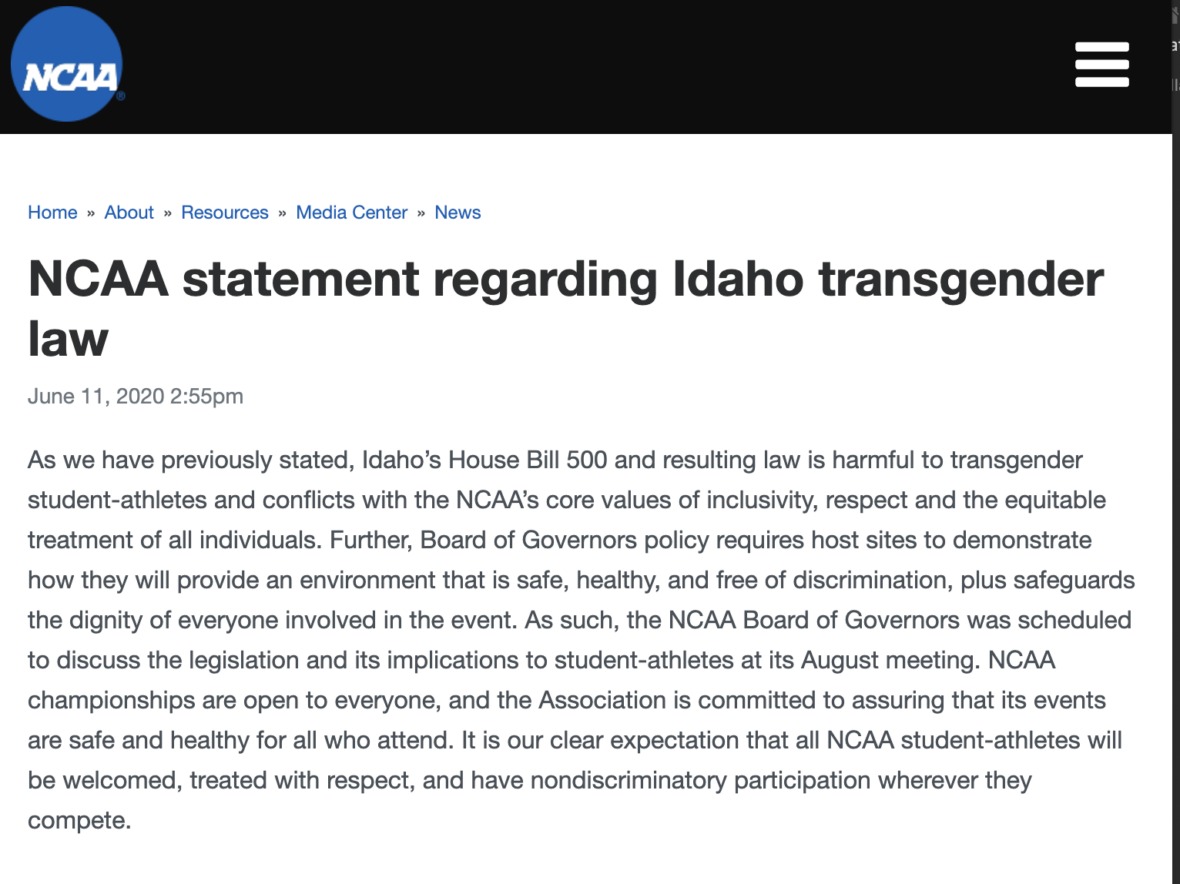
This story was updated on Thursday, June 11 to reflect a NCAA statement on Idaho’s law.
Dozens of advocacy organizations and hundreds of athletes are asking the NCAA to move college sports events out of Idaho in response to a state law that bans transgender women from participating in women’s sports.
The coalition argues that Idaho’s law “blatantly targets an already-marginalized community,” and runs contrary to the values of the NCAA, which governs collegiate athletics. Athletes argue that Idaho should be banned from hosting NCAA events as long as the law is in place.
“This is the time for the NCAA to stand on the right side of history and support the rights of all athletes in Idaho to compete in the sports they love,” reads a letter signed by more than 400 student athletes. “…With HB500 remaining law in Idaho, it is impossible for the NCAA to host events that are inclusive and safe for all athletes.”
The NCAA responded Thursday, issuing a statement that Idaho’s bill “conflicts with the NCAA’s core values of inclusivity, respect and the equitable treatment of all individuals.” The organization said its Board of Governors will discuss the legislation at its next board meeting scheduled for August.
“It is our clear expectation that all NCAA student-athletes will be welcomed, treated with respect, and have nondiscriminatory participation wherever they compete,” the statement said.

If the NCAA agrees with the letters and revokes Idaho games the decision could impact the first and second rounds of the 2021 Men’s Division I Basketball Championship, which are scheduled to take place at Boise State University in the spring of 2021.
Idaho became the first state to ban transgender female athletes in women’s sports in March, when Gov. Brad Little signed the so-called “Fairness in Women’s Sports Act,” written by Rep. Barbara Ehardt, R-Idaho Falls, and Sen. Mary Souza, R-Coeur d’Alene.
Sponsors, and some Idaho athletes, argue the law protects women from having to compete against transgender athletes who could have a physical advantage. The legislation drew multiple protests from opponents who argue that the law is discriminatory and also opens the door to invasive physical exams if an athlete’s gender is in dispute.
Civil rights groups sued the state barely two weeks after Little signed the law, arguing that it violates the U.S. Constitution, as well as Title IX, a law that bans sex discrimination in education. That lawsuit is still winding its way through the courts.
The NCAA has previously stripped states of championship games to protest legislation restricting transgender rights. The organization removed games from North Carolina in 2016-2017 after that state passed a bill requiring transgender people to use the bathrooms matching their sex at birth. The organization later allowed games to return when the bathroom bill was repealed.
Famous LGBT athletes, including tennis pro Billie Jean King and Olympic soccer star Megan Rapinoe, signed the letter asking the NCAA to disqualify Idaho from hosting events. So did Chris Mosier, a transgender athlete and activist who led a Boise protest against the bill this spring. A Boise State University athlete and assistant coach were among the 400 collegiate sports representatives who signed the letter.
Read the full text of the professional athlete letter here, the student letter here, and the organization letter below.
